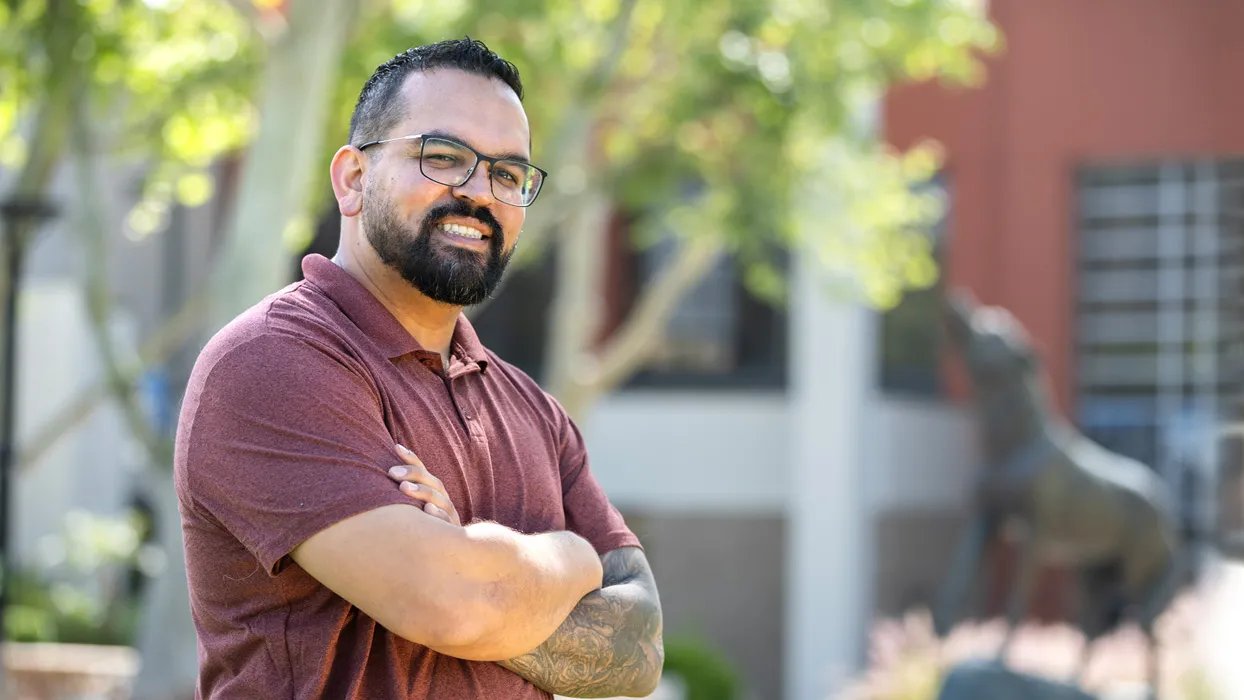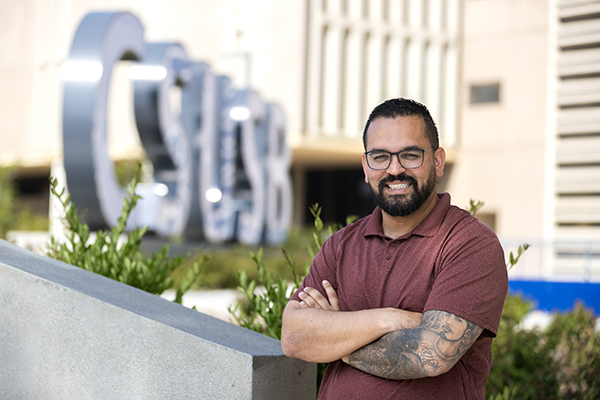Alan Llavore | Office of Marketing and Communications | (909) 537-5007 | allavore@csusb.edu

On May 17, at age 34, Michael Griggs donned his cap and gown, a symbol of academic achievement. And, in his case, it was also a testament to resilience and redemption. Griggs received his master’s degree in social work, earned a 4.0 GPA, graduated with honors and was awarded Social Work Student of the Year by CSUSB’s School of Social Work. In addition, he has been accepted to the doctoral program in social welfare at UCLA – all milestones that seemed unfathomable less than 10 years ago when he was serving time in a California penitentiary.
Born in Riverside, Calif., Griggs grew up in a dual-parent household, the youngest of three boys. His mother, who immigrated to the U.S. from Guatemala, highly valued education and earned associate’s, bachelor’s and master’s degrees. However, the specter of incarceration loomed large in his family, and his siblings were frequently entangled in the juvenile and adult justice systems.
"Growing up, I normalized the idea of getting in trouble. It was just part of life," Griggs said.
Despite the challenges, he excelled academically. The family moved to Victorville when he was in second grade, and he participated in gifted and talented programs and sports throughout his elementary and middle school years. For Griggs, high school proved to be a turning point, marred by racial tensions and gang violence.
A standardized test misplacement in eighth grade derailed his high school academic path, and Griggs was relegated to remedial classes, where the majority of his peers were entrenched in gang culture. He found himself suspended, on probation, and in and out of juvenile hall throughout high school. In 2009, when he was a senior, he was arrested for armed robbery and incarcerated. He faced a potential life sentence.
Determined to graduate, and with only one English class standing between him and his high school diploma, he wrote to his teacher while being held in county jail. “Hey, is there any way I can finish this class? They won't allow any books to come in here. They won't allow any homework to come in,” he said. “She wrote me back, and asked, ‘Do you have access to books? Write me book reports.’
“That was my first exposure to correspondence-based education,” Griggs said. “That would prove useful later on because that's the only type of education that was offered in prison — correspondence-based college classes. I craved education during that time. It became a privilege I yearned for.”
During those initial years, Griggs gained insight and mentorship from those around him. “I met a guy who had a life sentence without the possibility of parole. He had been inside since he was 14 years old. He was brilliant,” Griggs said. “He taught himself the whole calculus sequence. He had multiple associate degrees and certificates. I remember thinking to myself, ‘Man, this guy doesn't even have a release date, and he's sitting in here trying to better himself. What am I doing?’ He really inspired me.
“After that, he told me which inmates to connect with because they were the people who were in college. He said, ‘They’ll keep you out of trouble.’ These guys really valued life and really wanted to have a second opportunity to make amends. That's where I got a lot of mentorship,” he said.

Griggs immersed himself in learning as much as he could, teaching himself drawing, earning certifications as an electronics technician, enrolling in community college courses and earning an associate degree in social and behavioral science.
One evening, he watched a TedX talk featuring Renford Reese, professor of political science at Cal Poly Pomona and the founder/director of the Prison Education Project. Reese also founded The Reintegration Academy, a program that provides life skills, career development and vocational education to individuals recently released from prison.
“I wrote down his name when I was in prison, and I held on to that name for years. And when I got out in 2015 after serving six years, I looked him up on the Cal Poly website and sent him an email. I said, ‘Hey, I just got out. I'm interested in your Reintegration Academy. I saw your video, and I would like to be a part of it. Just give me an opportunity, and I'll do it.’
“He called me. He interviewed me. He gave me the opportunity,” Griggs said.
Through the academy, Griggs gained his first true exposure to higher education. “Dr. Reese took us on campus tours in the springtime — it was very intentional. He believed in the ambiance of the college experience and wanted us to see the flowers blooming and the smells as you walk across a campus. I had never been on a university campus before. We toured Cal Poly Pomona and the Claremont Colleges, and one of the sessions was at Pitzer College. They talked about the college’s core values — social responsibility, intercultural understanding, environmental sustainability. A lot of these things stood out to me because they were social-justice oriented.”
Griggs learned about a Pitzer scholarship for nontraditional students, took a chance and applied. “I ended up getting a full ride scholarship. I started in fall 2016 as an upper division sophomore.”
At Pitzer, he thrived academically, despite grappling with feelings of displacement among his more affluent peers. “Even though I was still young, I felt very old,” he said. The only formerly incarcerated student enrolled in the college at that time, Griggs said, “I felt I had lived a lot of lifetimes compared to my classmates who were transferring there straight out of high school. And there were a lot of students from affluent backgrounds. Here I was living in transitional housing, and I was as poor as you could be. I was a dishwasher. So, there was this dichotomy.”
Undeterred, he immersed himself in a social justice curriculum, creating his own major to explore his passion for activism. He found connections in his professors' mentorship and the camaraderie of fellow scholars and began advocating for criminal justice reform and educational equity.
"I wanted to study the social movement — why people mobilize, why they succeed. That really fascinated me," he said of his academic journey. His advocacy extended beyond the classroom, as he began lobbying for criminal justice reform and spearheading initiatives to remove barriers to education for justice-involved individuals.
While going to college, Griggs became a union plumber in Los Angeles and worked for four years until he was laid off because of the pandemic. Unsure of his next academic move, he began searching for a new job and on a whim, typed “social justice jobs” into an online search engine. A posting for an outreach coordinator with Cal State San Bernardino’s Project Rebound appeared at the top of the search page.
He landed the job, which involved guiding formerly incarcerated students on their educational journeys in 2021. Here Griggs was able to gain mentorship and guidance from Annika Anderson, CSUSB associate professor of sociology and executive director of Project Rebound, and Paul Jones, then-director of Project Rebound, both of whom encouraged Griggs to continue his academic pursuits.
Griggs was not only helping justice-involved students attain their academic goals, but he too became a participant of Project Rebound. “Although I’ve had great mentorship from past professors at Pitzer, there is nothing like feeling like you’re part of a community and pursuing education with peers who have similar life experiences,” Griggs said. At Project Rebound, he was able to see the success of the students he helped support. “Not only were they excelling academically, but they were also winning some of the highest honors and going on to graduate school. It was inspiring to witness their success,” he said.
“Project Rebound gave me social capital. Here, I was able to get the in-depth guidance and support I needed to shift my thinking beyond what I had ever considered,” Griggs explained. This experience inspired him to think about doctoral studies, expanding his aspirations to become a professor of social work and providing mentorship to future generations, just as his professors had done for him.
“People, especially youth, often ask me what they can do with their criminal background. They think their life is over after committing their crime or getting in trouble,” he said. “But if you look at my background, many would have written me off. I’m proof that people can change, and education can open the doors to opportunity. Today, I work for the state of California with the Project Rebound Program. I just finished an internship at the Federal Public Defender's Office, and I’m pursuing a doctoral degree. So, I tell people, ‘If I can do these things, so can you. There is nothing stopping you from achieving your goals, especially now that there’s support out there for justice-impacted people pursuing education.”
Though he graduated in May, Griggs will continue his work with Project Rebound at CSUSB while he earns his doctorate. “This is work that I'm very much passionate about that — I don't really feel it's work. Helping people achieve their dreams is very fulfilling,” Griggs said.
As he begins the next leg of his academic journey at UCLA, Griggs envisions a future where he can make an impact on prison education and forensic social work. Inspired by trailblazers like Project Rebound founder John Irwin and the Reintegration Academy’s Reese, he sees his doctoral studies as a means to implement meaningful change and empower future generations.
“I'm pursuing my Ph.D. in social welfare because I want to build a high-quality bachelor’s or master’s college-in-prison program, where incarcerated individuals can engage in rigorous academic pursuits," Griggs said. “There are so many brilliant people inside prison who are limited to earning associate degrees. My Ph.D. will lend validity to the work that I do in the future and will also make the biggest impact on students’ lives moving forward,” he said.